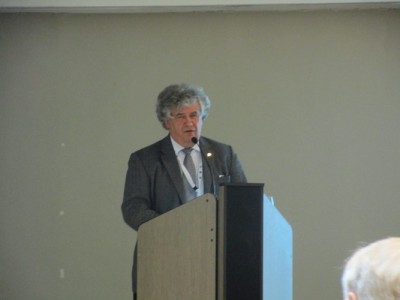NSU Newsroom
SharkBytes
Horizons
This version of NSU News has been archived as of February 28, 2019. To search through archived articles, visit nova.edu/search. To access the new version of NSU News, visit news.nova.edu.
This version of SharkBytes has been archived as of February 28, 2019. To search through archived articles, visit nova.edu/search. To access the new version of SharkBytes, visit sharkbytes.nova.edu.
Halmos College Professor and Dean Present at Historic Offshore Oil Development Conference in Cuba
Alexander Soloviev, Ph.D., professor at the Halmos College of Natural Sciences and Oceanography (HCNSO), and Richard Dodge, Ph.D., professor and dean of HCNSO, presented research at a symposium in Havana, Cuba, addressing pivotal issues surrounding offshore oil development in the Caribbean and Gulf waters.
Safe Seas Clean Seas—One Gulf and Caribbean Offshore Environmental Drilling Symposium brought together experts and leaders from the U.S., Cuba, and other Caribbean nations. The purpose was to help establish uniform environmental and safety policies for offshore drilling, and promote cooperation and understanding in preventing oil spills.
Organized by Houston consulting firm Hunt Petty, the conference was held October 18–21 and attended by more than 120 people in Cuba, which may resume plans for offshore drilling in 2016.
Soloviev and Dodge co-authored and presented “Ocean Circulation near Cuba and Florida: Existing and Needed Observations” during a session addressing issues related to sensitive environmental emergencies.
“The presentation was intended to inform what is known about ocean currents in and around Florida and Cuba, how that information may affect design and safe operation of oil drilling platforms, and where an oil spill may go if there is an accident resulting in an oil spill from drilling in Cuba or the Gulf of Mexico,” Dodge said.
“This conference was the first time that U.S. and Cuban officials and scientists formally met together to discuss common issues related to oil drilling and safety to life and environment. It portends possible normalization of U.S.-Cuban relations in the future. The meeting also identified possible ways that U.S. technology for drilling and safety might be available to Cubans in spite of the current [U.S.-imposed trade] embargo.”
Said Soloviev: “The conference in Havana is an important step in activities to preserve the health of the U.S. and Cuba’s marine ecosystems from potential oil spills. The ocean currents on the northwest Cuban shelf are very intense and variable, representing a great challenge for oil drilling. This also is an area of Cuba’s anticipated oil drilling blocks.
“Increased oceanographic observations between Cuba, the Bahamas, and the U.S. are needed for monitoring drill installation stability, environment and oil spill identification, tracking, and mitigation. The college is one of the major players in the Straits of Florida oceanography and is well positioned to help in this direction.”
